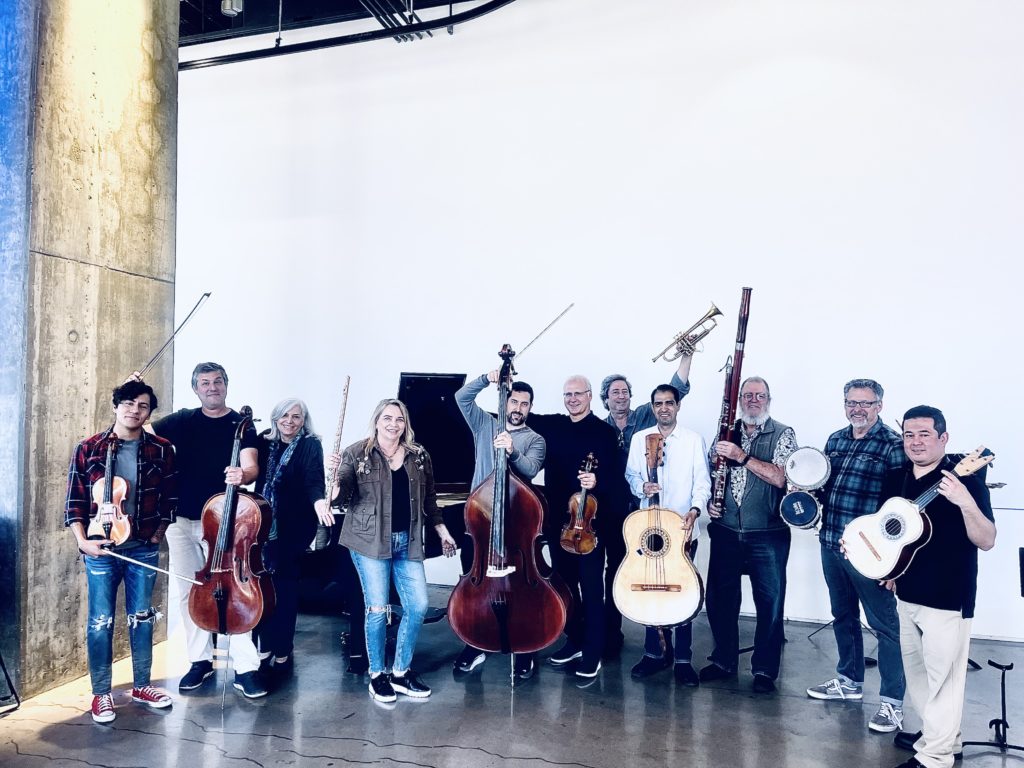Camarada Celebrates Mariachi Traditions and Influences at Park & Market
In recent seasons Camarada has presented several programs that have demonstrated how the Argentine tango influenced classical music in Latin America. Camarada’s Saturday concert, titled En Fuego on Camarada’s Music of the Americas@Park & Market series, celebrated mariachi music and its influence on the music of this hemisphere. Camarada Artistic Director Beth Ross Buckley wisely recruited Jeff Nevin, founder and head of Southwestern College’s highly respected mariachi degree program, to lead and narrate this concert.

En Fuego musicians: Jesus Jimenez, Abe Liebhaber, Dana Burnett, Beth Ross Buckley, Andrés Martín, David Buckley, Jeff Nevin, Jonathan Bautista, David Savage, Matt Armstrong, Rafael Hernández [photo courtesy of Camarada]
This same trio quickly segued into Martín’s own 2020 On Fire!—a contrapuntal etude that begins with moody, meandering themes, but concludes with bright, rapid-fire roulades. Still setting the stage for mariachi, Martín and pianist Dana Burnett gave a winning, dramatic account of Astor Piazzolla’s popular milonga Oblivion.
According to Nevin, Mexican composer Arturo Márquez’s 1996 Danzón No. 4, originally written for chamber orchestra but arranged for eight Camarada musicians by percussionist Matt Armstrong, clearly shows the influence of Mexican popular music, including the mariachi tradition. Although the danzón was originally an offshoot of the Cuban habañera, when the danzón was adopted in Mexico, it absorbed local traditions. Danzón No. 4 begins over a slow, hypnotic but clearly defined rhythmic pulse and soon develops into an exuberant conclusion filled with florid solos by trumpeter Nevin and flutist Beth Ross Buckley.
Another work inspired by Mexican mariachi music, Silverstre Revueltas’ 1933 Ocho por Radio, featured Nevin’s bright, cleanly accented trumpet solos spread over quickly changing meters.
Aaron Copland’s frequently programed orchestral tone poem El Salón México was inspired by trips the American composer made to Mexico City in the early 1930s, guided by the Mexican composer and conductor Carlos Chávez. Chávez took his American colleague to Mexico City’s famous dance bar El Salon Mexico, where Copland was exposed to music like Revueltas’ Ocho por Radio and Amador “Dimas” Pérez’s Nereidas, which Nevins included on Saturday’s program.
Pérez’s harmonic vocabulary and suave melodies are similar to those of the popular 1930 swing bands that flourished north of la frontera, but Pérez’s brilliant trumpet volleys that soar into the instrument’s highest range reveal his distinct mariachi legacy. Nevin played these flashy solos with panache, and his arrangement of Nereidas included his colleagues Rafael Hernández on vihuela and Jonathan Bautista on guitarrón to emphasize the authentic mariachi sonority of the work.
Other works on Camarada’s program representing the mariachi tradition were Rubén Fuentes’ La Bikina, based on an insistent Venezuelan clave rhythm, and Álvaro Carillo’s ingratiating bolero Sabor a Mí.
One more Copland connection on the program: among the five short selections from Alberto Ginastera’s Twelve American Preludes, Op. 12, for solo piano played by Dana Burnett, she included the aptly complex prelude “Tribute to Aaron Copland.” Revueltas studied with Copland, so in his case, the musical influences traversed la frontera in both directions!
This concert was presented by Camarada at UC San Diego’s Park & Market in San Diego’s East Village on Saturday, April 22, 2023.

Ken Herman, a classically trained pianist and organist, has covered music for the San Diego Union, the Los Angeles Times’ San Diego Edition, and for sandiego.com. He has won numerous awards, including first place for Live Performance and Opera Reviews in the 2017, the 2018, and the 2019 Excellence in Journalism Awards competition held by the San Diego Press Club. A Chicago native, he came to San Diego to pursue a graduate degree and stayed.Read more…

I attended the concert and it was exciting. It was so hot that it set the place on fire because fire engines were circling the building. They were sure there was a fire but could not find it.